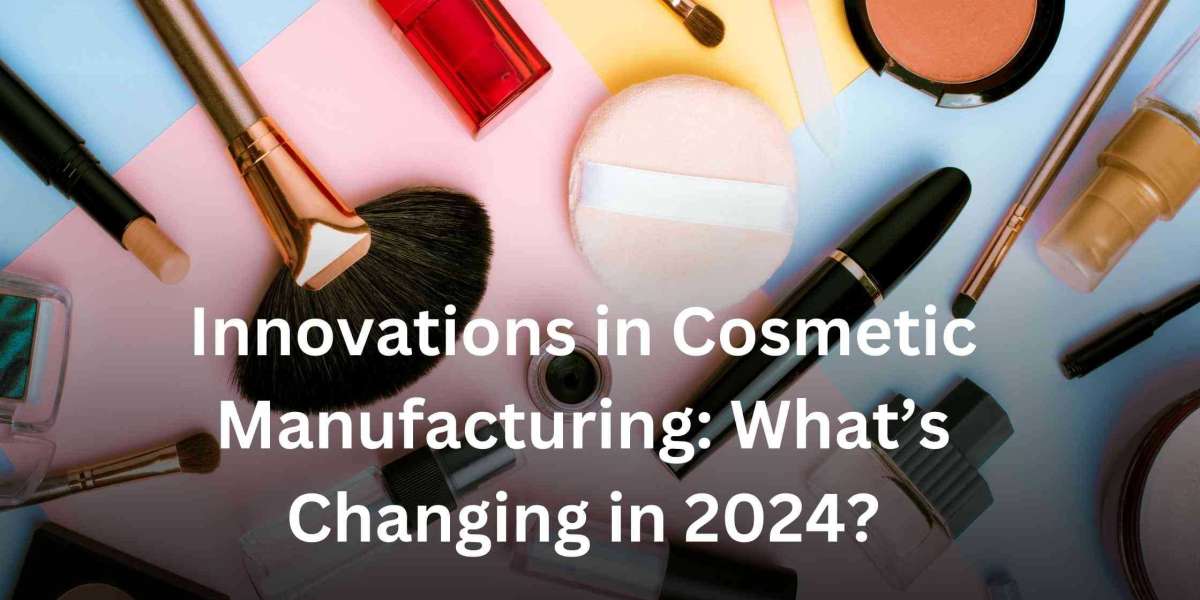The cosmetic industry is continuously evolving. As consumer preferences shift and new technologies emerge, cosmetic manufacturing must also adapt to meet the growing demand for innovative, safe, and sustainable beauty products. In 2024, the cosmetic manufacturing sector is witnessing groundbreaking changes driven by advancements in technology, sustainability practices, and changing consumer trends.
In this blog, we’ll explore the top innovations transforming the cosmetic manufacturing landscape in 2024, while also highlighting key regulatory aspects like CDSCO cosmetic import registration in India, CDSCO cosmetic manufacturing license in India, and other related requirements.
1. Sustainable and Eco-Friendly Manufacturing Practices
Sustainability is a key focus in nearly every industry, and cosmetic manufacturing is no exception. Consumers today are more aware of the environmental impact of the products they use, which has led to a demand for eco-friendly, sustainable beauty products. This shift has pushed cosmetic manufacturers to adopt greener practices.
a. Zero-Waste Packaging
More companies are reducing plastic use and embracing biodegradable, recyclable, or reusable packaging materials. Zero-waste packaging options, like refillable containers and plant-based plastics, are becoming increasingly popular. In 2024, many cosmetic manufacturers are rethinking their packaging strategies to cut down on waste and plastic pollution.
b. Green Chemistry
The rise of green chemistry, which focuses on reducing or eliminating hazardous substances from cosmetic formulations, is a major trend in 2024. Manufacturers are developing new production processes that minimize the use of harmful chemicals, leading to safer and more sustainable products for consumers and the environment.
c. Waterless Beauty Products
Water scarcity concerns have led to an increase in waterless cosmetic products. Waterless formulations such as solid cleansers, dry shampoos, and powdered foundations are becoming mainstream. These products not only require less water during manufacturing but also tend to have longer shelf lives.
2. Advanced Biotechnology in Cosmetics
Biotechnology is revolutionizing how cosmetic ingredients are developed and manufactured. In 2024, biotech-based ingredients are making a significant impact on the cosmetic industry, allowing for safer and more effective products.
a. Lab-Grown Ingredients
Lab-grown ingredients, such as collagen, peptides, and even plant extracts, are becoming more common in the cosmetic industry. By creating these ingredients in laboratories, manufacturers can ensure consistent quality, reduce the environmental impact of traditional harvesting methods, and avoid the use of animal-derived products.
b. Biomimicry
Biomimicry, the science of mimicking natural processes, is being used to create innovative cosmetic products. In 2024, we’re seeing the rise of products that replicate the benefits of natural substances. For example, synthetic silk proteins or plant-based alternatives to animal collagen offer similar benefits without the ethical and environmental concerns associated with traditional sources.
c. Probiotics in Skincare
Probiotic skincare is gaining popularity, with cosmetic manufacturers incorporating beneficial bacteria into formulations to improve skin health. These probiotics help balance the skin’s microbiome, resulting in better hydration, reduced irritation, and overall healthier skin. In 2024, we can expect more research and innovation in this area, leading to more effective probiotic-based cosmetic products.
3. Personalization and AI-Driven Manufacturing
In 2024, consumers are looking for personalized beauty solutions that cater to their unique skin types, tones, and preferences. Cosmetic manufacturers are leveraging artificial intelligence (AI) and data analytics to offer customized products.
a. AI-Powered Formulation
AI is being used to analyze customer data, including skin conditions, preferences, and even genetic makeup, to create personalized cosmetic formulations. This allows for highly targeted products that meet the specific needs of individual customers. AI tools can also predict how different ingredients will interact with a person’s skin, ensuring that formulations are both effective and safe.
b. 3D Printing in Cosmetics
3D printing technology is starting to make its mark in cosmetic manufacturing. In 2024, 3D printers are being used to create custom-designed makeup products, such as lipsticks and foundations, that perfectly match the user’s skin tone or desired look. This technology also reduces waste by allowing manufacturers to produce only the exact amount needed, minimizing excess inventory.
c. At-Home Beauty Devices
As technology advances, consumers are gaining access to at-home devices that offer personalized beauty treatments. Devices such as AI-powered skin analyzers, customized face masks, and personalized skincare dispensers are becoming more common. These innovations allow customers to experience professional-level beauty treatments in the comfort of their homes.
4. Clean Beauty Movement
The clean beauty movement continues to grow in 2024, with consumers demanding transparency about the ingredients used in their cosmetic products. Clean beauty focuses on using non-toxic, natural, and ethically sourced ingredients.
a. Free-from Formulations
Consumers are increasingly seeking products that are free from harmful chemicals like parabens, sulfates, and synthetic fragrances. Manufacturers are responding by offering clean formulations that exclude these ingredients, focusing on safe, natural alternatives. In 2024, the demand for “free-from” products is stronger than ever, driving innovation in clean cosmetic formulations.
b. Ingredient Transparency
In 2024, transparency is more important than ever. Consumers want to know exactly what’s in their beauty products and where the ingredients come from. Cosmetic companies are using clear labeling, traceability technologies, and even blockchain to provide detailed information about the origin and safety of their ingredients.
c. Natural Preservatives
To ensure product safety and shelf life, manufacturers are turning to natural preservatives. Ingredients like radish root ferment, rosemary extract, and honeysuckle extract are being used as alternatives to synthetic preservatives like parabens. These natural preservatives help maintain the product's effectiveness without compromising the clean beauty standards.
5. Regulatory Innovations: CDSCO Compliance and Approvals
Alongside innovations in technology and product development, the regulatory landscape for cosmetics in India is also evolving in 2024. CDSCO cosmetic import registration in India, CDSCO cosmetic manufacturing license in India, and dual use NOC in India are critical requirements for companies manufacturing or importing cosmetics into the Indian market.
a. CDSCO Cosmetic Import Registration in India
To import cosmetics into India, manufacturers must obtain a CDSCO (Central Drugs Standard Control Organization) registration. This process ensures that imported products meet India’s safety and quality standards. In 2024, stricter regulations and faster approval processes are making it easier for global cosmetic brands to enter the Indian market, but companies must stay updated with regulatory changes to remain compliant.
b. CDSCO Cosmetic Manufacturing License in India
For local manufacturers, acquiring a CDSCO cosmetic manufacturing license in India is mandatory. This license certifies that the cosmetic products manufactured in India are safe, free from harmful chemicals, and meet the country’s quality standards. The licensing process is becoming more streamlined in 2024, with digital applications and faster approvals. Manufacturers are also benefiting from increased support from regulatory bodies to help ensure compliance.
c. Dual Use NOC in India
Certain cosmetic products may have dual uses, meaning they serve both cosmetic and therapeutic purposes. For such products, a CDSCO dual-use NOC in India (No Objection Certificate) is required from the relevant authorities. In 2024, the process for obtaining this NOC has become more efficient, helping companies bring multifunctional cosmetic products to market faster.
d. CDSCO Registration in India
Whether manufacturing or importing, CDSCO License registration in India is a critical step for ensuring legal compliance. In 2024, the CDSCO has introduced more transparent procedures, making it easier for cosmetic companies to navigate the regulatory landscape. This registration ensures that products sold in India meet safety, quality, and labeling requirements.
6. Ethical and Inclusive Beauty
Ethical beauty, which includes cruelty-free, vegan, and fair-trade products, is gaining traction. In 2024, the cosmetic industry is placing greater emphasis on inclusivity and diversity, catering to a broader range of skin tones, types, and beauty needs.
a. Cruelty-Free and Vegan Beauty
The demand for cruelty-free and vegan cosmetics is continuing to rise. In response, cosmetic manufacturers are eliminating animal testing and animal-derived ingredients from their products. Certifications such as Leaping Bunny or PETA’s cruelty-free logo are becoming standard in the industry, ensuring that products align with consumer values.
b. Inclusive Beauty Products
Consumers today expect beauty brands to cater to all skin tones and types. In 2024, we’re seeing more inclusive product lines with a wider range of shades for foundations, concealers, and lip products. Brands are also focusing on creating formulations suitable for different skin concerns, such as sensitive, oily, or dry skin.
c. Fair Trade and Ethical Sourcing
Ethically sourced ingredients are increasingly important to consumers. In 2024, cosmetic manufacturers are prioritizing fair-trade ingredients and working directly with farmers and producers to ensure that their supply chains are sustainable and ethical. This includes using responsibly harvested botanical extracts and ensuring that workers in the supply chain are paid fairly.
Conclusion
The cosmetic manufacturing industry in 2024 is undergoing remarkable changes, driven by consumer demand for sustainability, personalization, and transparency. With advancements in biotechnology, AI, and ethical beauty practices, manufacturers are finding new ways to create innovative, high-quality products that meet the needs of today’s informed and conscious consumers.
As the industry continues to evolve, the focus on eco-friendly practices, cutting-edge technologies, and compliance with regulatory standards such as CDSCO registration in India, CDSCO cosmetic manufacturing license in India, and dual use NOC in India will shape the future of beauty, offering exciting opportunities for both manufacturers and consumers alike.








